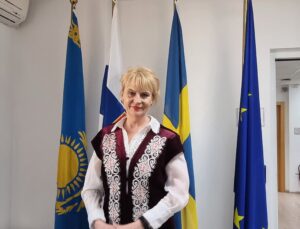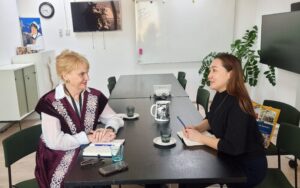ASTANA – As Kazakhstan and Sweden mark 33 years of diplomatic relations this April, Swedish Ambassador to Kazakhstan Ewa Ulrika Polano reflects on the growing partnership between the two nations. In an interview with The Astana Times, she highlighted key areas of cooperation—from trade and infrastructure to healthcare and education—while also emphasizing the role of women in society and Sweden’s commitment to supporting Kazakhstan’s economic transformation.

Swedish Ambassador to Kazakhstan Ewa Polano. Photo credit: The Astana Times
“Kazakhstan and Sweden have maintained diplomatic relations for over 30 years, reflecting strong ties and mutually beneficial cooperation across industries. The new Kazakhstan, in partnership with Sweden, can move toward a knowledge-based economy, focusing on innovation, entrepreneurship, and the growth of small and medium-sized enterprises,” said Polano.
She emphasized Sweden’s innovation model, the Triple Helix, which integrates businesses, universities, and government agencies to drive technological advancements. Sweden remains committed to supporting Kazakhstan in various sectors by sharing its expertise, technology, and values.
Polano noted that Swedish businesses are growing in Kazakhstan’s economy. Companies such as Volvo, Scania, Tetra Pak, Atlas Copco, and Alfa Laval, are strengthening their presence in the country.
Trade between Kazakhstan and Sweden reached $467 million in 2023, up from $325.9 million in 2022. Since 2005, Sweden’s direct investments in Kazakhstan have exceeded $622 million.
Academic and healthcare collaboration
Beyond business, Sweden is increasing its academic engagement with Kazakhstan. The Stockholm School of Economics, a globally ranked institution, plans to collaborate with Maqsut Narikbayev University to introduce a course blending economics, happiness, and mindfulness.
“The Stockholm School of Economics is seeking to collaborate with a Kazakh university to introduce a course on a crucial topic for success in economics—happiness and mindfulness. While it may sound like a wellness retreat, the focus is actually on integrating humanities, as well as human and social sciences, to add value in economics and trade. This is the essence of that initiative,” said Polano.
According to Polano, healthcare is another key area of cooperation, with Swedish companies such as AstraZeneca, Elekta, and Diaverum driving advancements in pharmaceuticals, cancer treatment, and dialysis in Kazakhstan.

Swedish Ambassador to Kazakhstan Ewa Polano with Aiman Nakispekova, The Astana Times journalist during the interview. Photo credit: The Astana Times.
“Over the past years, we have seen rapid growth in our healthcare collaboration with Kazakhstan. AstraZeneca is one of the leading companies in innovative medicines, Elekta developed the gamma knife for brain cancer treatment, and Diaverum operates 54 kidney dialysis clinics across Kazakhstan. Last May, I inaugurated the country’s first digital kidney dialysis clinic, where patients can receive treatment in a more comfortable setting,” she noted.
She also acknowledged the challenges in public healthcare accessibility, emphasizing the need for strategic investments and technology assessments to balance patient needs with government budgets.
Swedish companies are also contributing to Kazakhstan’s infrastructure and industrial modernization. Atlas Copco provides advanced hospital gas systems, while Scania and Volvo are modernizing the country’s transportation sector. In mining, Swedish firms Epiroc and Sandvik are introducing sustainable technologies, securing multi-million-euro contracts in Kazakhstan.
Empowering human capital and gender equality
Polano observes that the people of Kazakhstan have long demonstrated resilience in overcoming challenges. The country’s diverse population, shaped by historical migrations and displacements, has cultivated a deep-rooted culture of perseverance.
“Families with Polish, Ukrainian, and other ancestral ties have built new lives in Kazakhstan, reinforcing the idea that the country’s strength lies in its diversity. The adaptability and survival skills embedded in the nation’s nomadic heritage continue to shape what some describe as ‘Asian smartness’—a sharp ability to embrace rapid development and economic progress,” said Polano
“I think we all recognize that the youth here are highly motivated. They work hard, eager to develop quickly and move forward. The people of Kazakhstan possess remarkable talent and resilience in overcoming challenges. And youth have a great potential for success,” she added.
One of Sweden’s key diplomatic priorities is the promotion of gender equality. Sweden is a global leader in women’s rights and representation, and Polano highlighted the importance of increasing female participation in decision-making roles.
“Kazakhstan has strong, resilient women who take on leadership roles in business and society. But while women serve in parliament and government, their numbers remain low. Legislative quotas—like those in Sweden and Norway—could help increase female representation in leadership,” noted Polano.
She pointed to Sweden’s policy requiring political parties to present electoral lists with equal representation of men and women, as well as Norway’s mandatory quotas ensuring 50% female representation on corporate boards.
“Such policies have proven effective in accelerating gender equality. Implementing similar measures in Kazakhstan could help break long-standing biases in leadership selection and create a more balanced and inclusive society,” she added.
Polano also emphasized the need for financial support for small businesses, particularly those led by women.
“Walking through Kazakhstan’s streets, you see countless small businesses, but many struggle to expand due to financial barriers. Government-backed microfinancing initiatives could transform these businesses into engines of economic growth,” she said.
Prospects
Discussing the strengthening ties between Sweden and Kazakhstan, Polano highlighted the Unlocking the Great Potential initiative, which aims to support Kazakhstan’s economic diversification beyond oil and gas, fostering a knowledge-driven and innovation-led future.
In June, the Swedish Embassy plans to host a special event where Swedish companies will introduce new projects in Kazakhstan, further solidifying economic cooperation.
Polano hinted at a potential Volvo factory in Almaty, following Scania’s recent expansion in the Karagandy Region. Additionally, Swedish company Ecolin is investing in sustainable packaging solutions in Astana’s industrial zone.
As Kazakhstan pursues sustainable growth and greater global integration, Sweden remains a key partner, offering expertise in innovation, infrastructure, and economic development.
